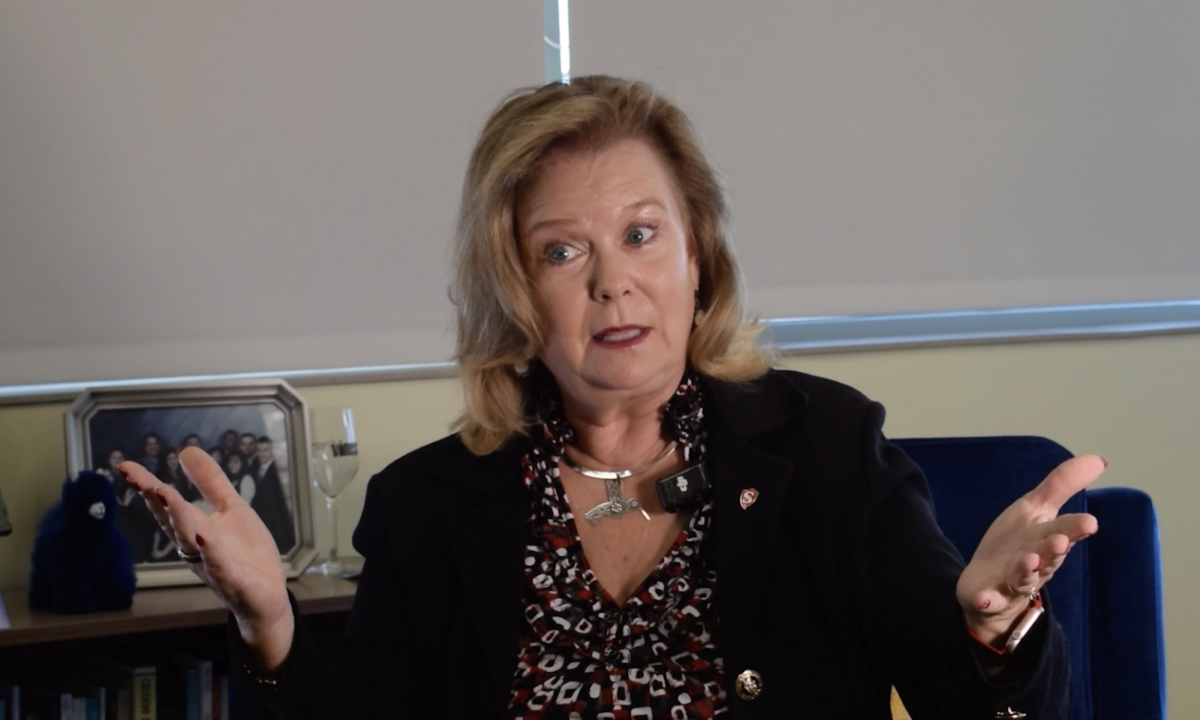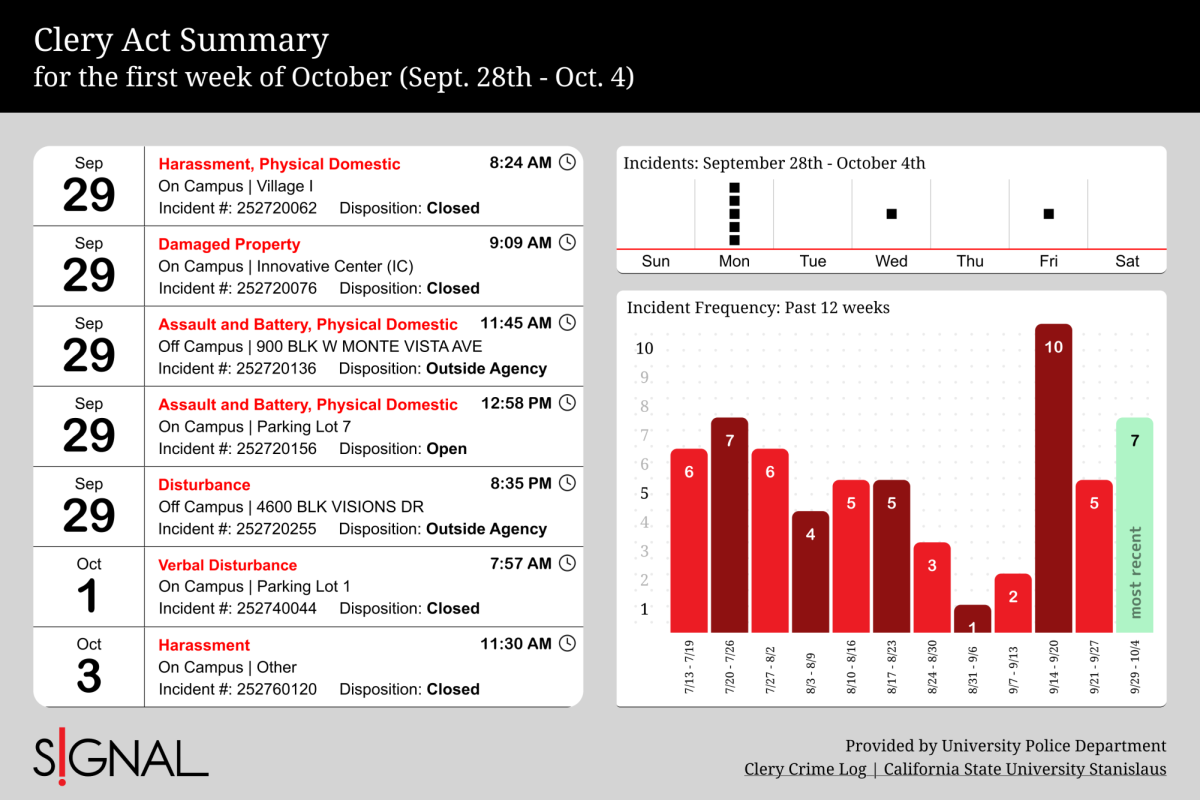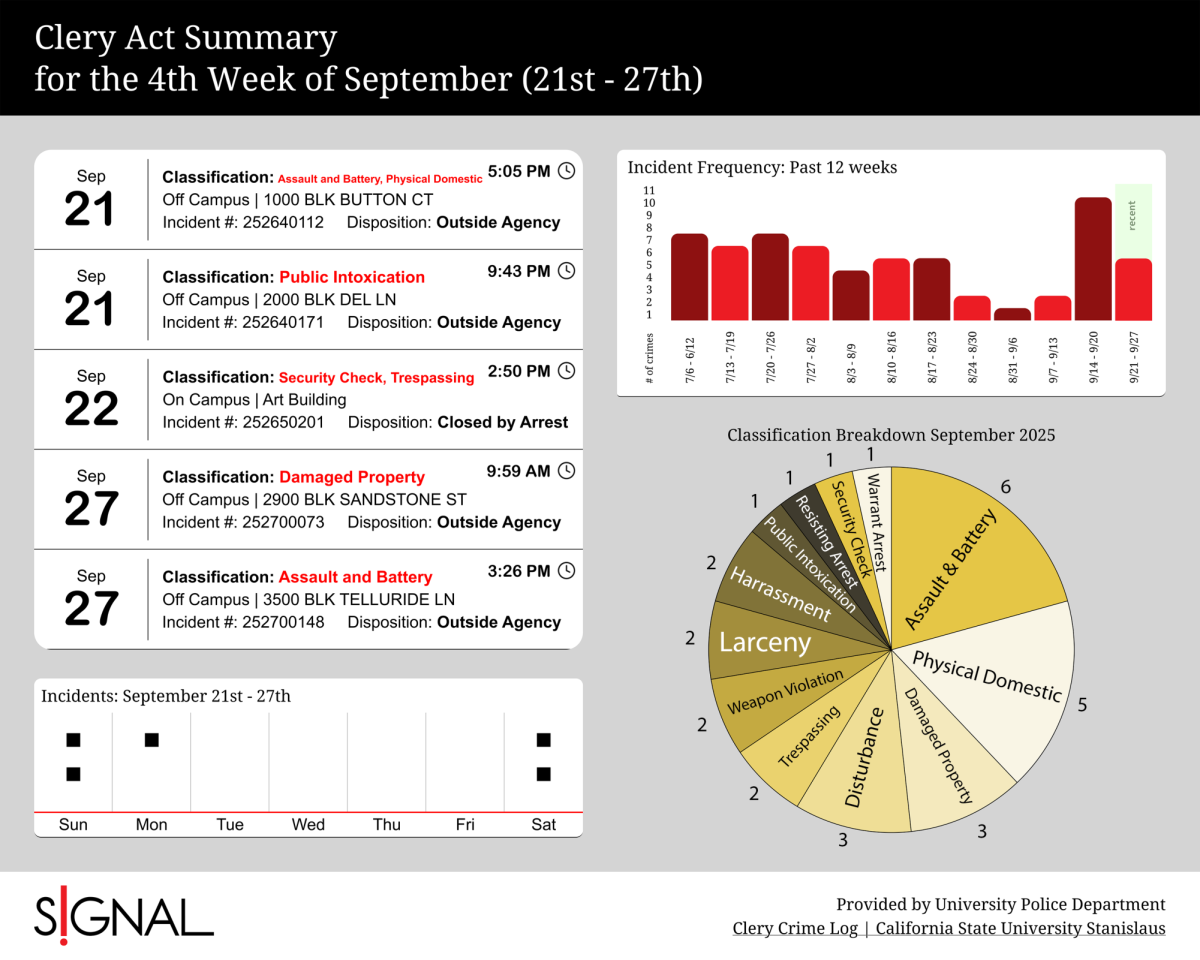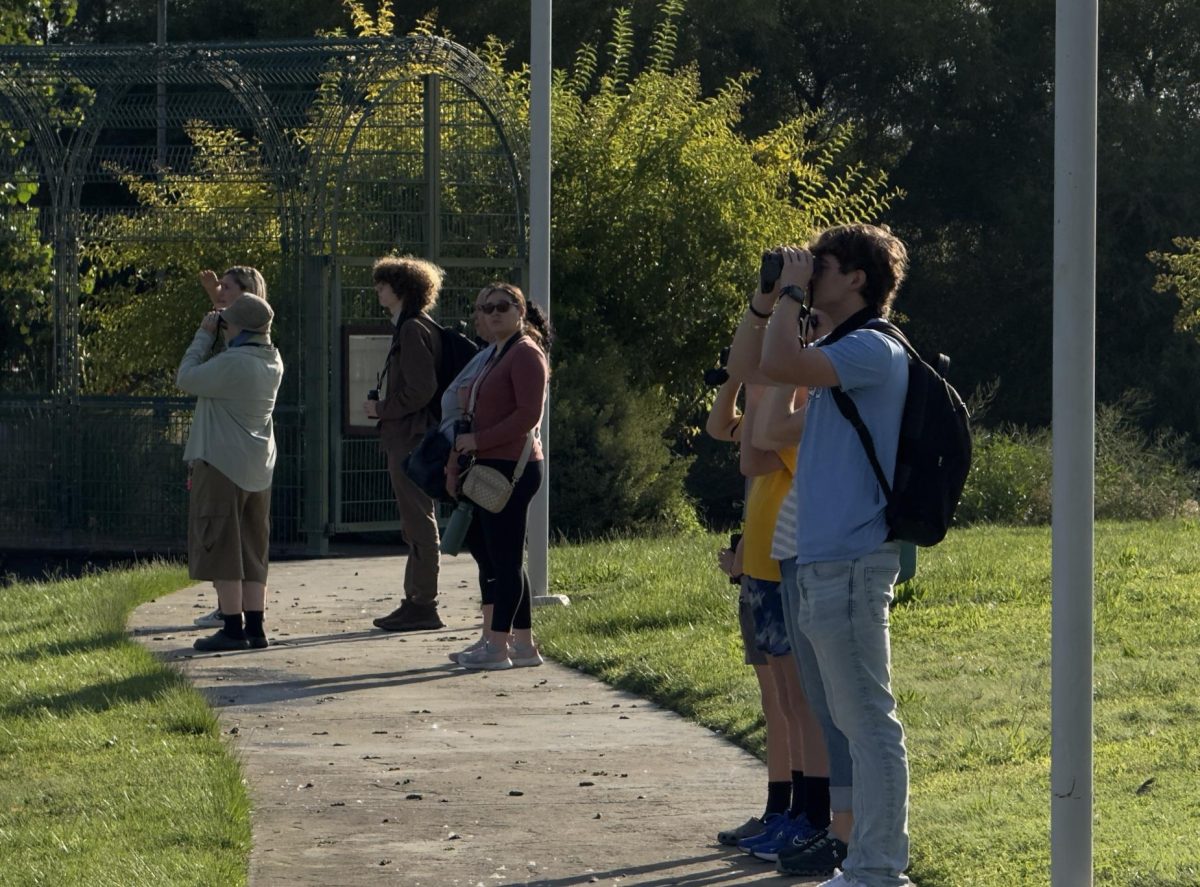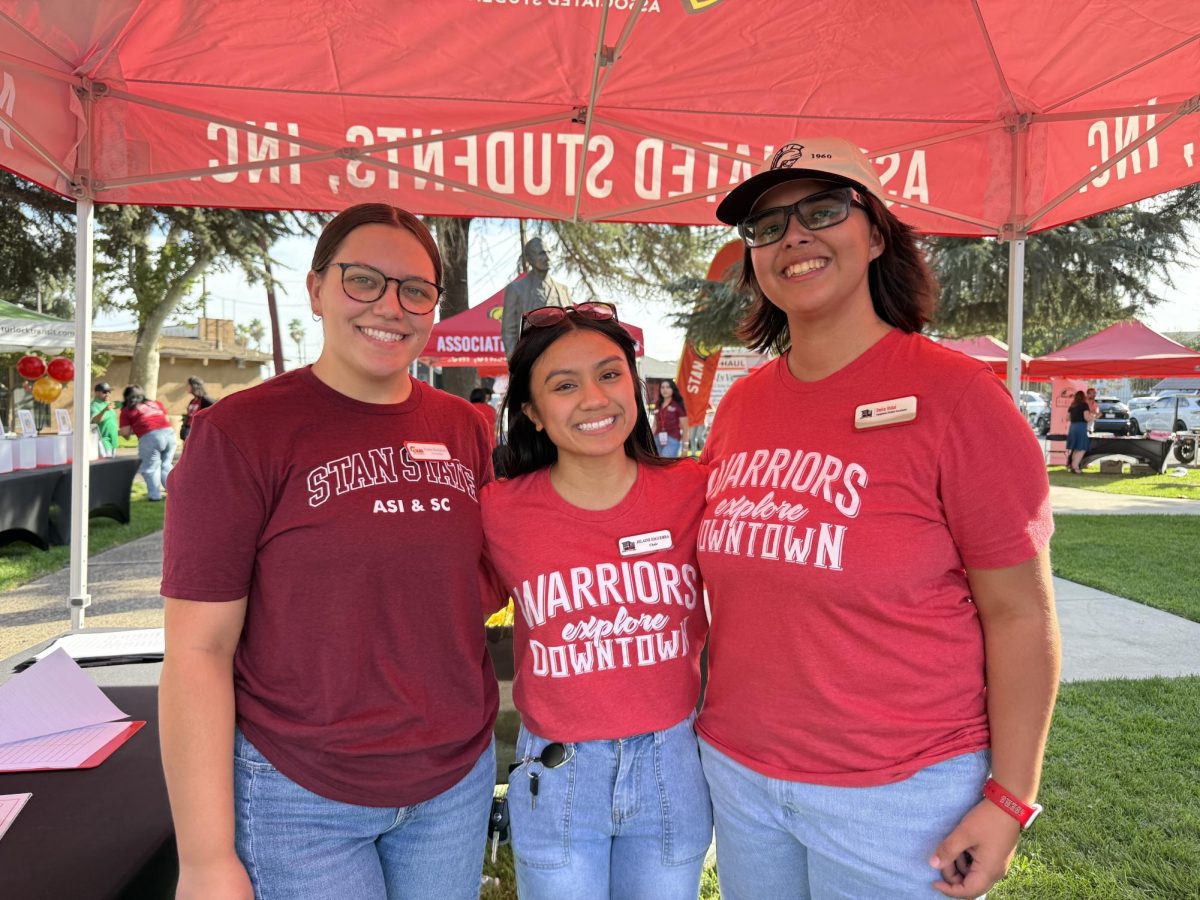As election results have tentatively rolled in, voters from the Stan State campus community have let their initial thoughts and opinions be known.
After months of campaign advertisements and debates, voters were finally able to have their voices heard. The question now is, what do the members of our community think about the results of those votes?
The Presidential Election
On November 7, the Associated Press called the election for Joe Biden as the president-elect and Kamala Harris as his vice president-elect. Although there are debates still persisting as to the finality of the electoral votes – Biden having received a total of 290 and current president Donald Trump a total of 214 – most voters believe that the presidential verdict will stand.
Hector Yerena (junior, English), who voted for Biden, says that he is hopeful that the results will stand and that positive change can be made. “In terms of how I feel about the presidential results, I am content and optimistic about it. I am happy with the outcome we have gotten, but I also want to see the changes that will occur in the future to further determine a stronger feeling.”
Stan State English professor Karen Zandarski also voted for the Biden/Harris ticket. She says that she feels disheartened that so many people still voted for Trump and Pence, but understands the dimensionality of voting demographics. “While I personally can not balance the negative and racist rhetoric with any policy agenda, not everyone feels that way,” Zandarski says.
Stephanie LeQuia (junior, Child Development and Psychology) was one of the many who voted for the Trump/Pence ticket. “I feel a little disappointed by the results of the election; however, I also feel excited for our country to have our first person of color as Vice President of the US!”
In contrast to what others had to say, LeQuia believes that the election is not over. She explains that “This is not different from other years in that respect. Joe Biden is the projected winner, but final results will not be out for some time. On November 9, court cases will begin to decide if there was enough voter fraud to change the outcome of the election.”
Timea Friesen (junior, English), who also voted for Trump, believes the election is over, but remains cautious. “We should wait to see what happens with the legal battles and cheating allegations before announcing a winner,” Friesen says.
CSU Long Beach student Klarissa Guzman (junior, English), who would have voted for Trump had circumstances allowed, shares her mixed feelings about the election. “I have been hearing that there were ballots not counted or states that cheated, so the election would turn out in Biden’s favor… With the lawsuits that President Trump is filing in some states, I think it could prolong this election.”
A source that preferred to stay anonymous due to the personal nature of political affiliations says, “Although Biden isn’t the best candidate, he is still better than our President now and will bring good change to our country, I believe. It feels to me that Trump will try to cause trouble with the final call of the election all the way until January 20.”
The source explains that, although they are confident that Biden will end up the winner, they are also being cautious. “I don’t want to celebrate Biden winning until I know for certain that he actually won and Trump doesn’t try to pull something.”
The Current Debate Regarding the Counting of Votes
The most prominent controversy surrounding the 2020 presidential election results is that of the validity of the electoral votes. President Trump has been declaring election fraud and asking for recounts, which is likely to extend the time until the election results are official. Much like the political parties, members of the campus community have conflicting opinions about the topic.
Yerena, Zandarski and our anonymous source believe in the trustworthiness and validity of the voting methods, while LeQuia, Friesen and Guzman have some doubts.
Yerena says, “I believe that this year was a fair election in terms of voting methods. I know people may disagree with that, especially with how crazy things have been, but I believe that this was still a fair election. I also do trust our voting system.”
Our anonymous source affirms Yerena’s statement. “I absolutely trust our voting system and I believe that this year was a very fair election. So many people have come of legal voting age, including me, since Trump’s election in 2016, and this brought about many new liberal votes to the country,” the source explains.
The source also defended the safety and validity of mail-in voting. “Mail-in voting has been a thing for a very long time and has always been trustworthy. I believe that the mistrust of mail-in voting was just paranoia and a method to deter voters from voting at all.”
LeQuia shared an opposing perspective, saying that “No one knows if there is as much fraud as Trump has stated. However, it is certain that every election includes at least a small amount of fraud. I have seen cases of people registered in multiple states and voting in both. I have also seen cases of people voting under the name of someone deceased,” LeQuia claims.
Friesen agrees with LeQuia, stating “I think there were a lot of things that came out in this election that made our voting system hard to trust. I volunteered in the Stanislaus County main office a few years ago on Election Day, and the process and the people seemed trustworthy… I definitely don’t think it’s perfect, especially with everything that was uncovered this election.”
Guzman’s opinion on the matter is tentative. Guzman says she initially believed the election to be fair, but “Now that I am seeing that things could have been messed with for cheating to take place, I am not sure if I can completely trust our voting system.”
State and Local Legislative Elects
Although the presidential election has procured most of the limelight this election season, the importance of state and local election results are not to be overlooked. Although results are not entirely official for every county, there have been several races that have clear winners or that have been conceived.
Zandarski shares that she is happy to see Josh Harder re-elected as the U.S. Representative for California’s 10th congressional district, although most of her focus has been on the national races.
Our anonymous source is also pleased that Harder will be representing their district in congress, and that Javier Lopez has been elected as the mayor of her hometown of Ceres over Bret Durrosette.
Friesen is happy about the local election results where she lives and not surprised by them nor the California election results. Guzman, on the other hand, says that she was kind of surprised that her local races were close in their numbers, but that the results themselves were expected.
Overall, most people seem to feel either neutral or satisfied with the state and local election results.
Propositions
The propositions this year have proven to be an incentive for discussion. Zandarski delves into the ideology of propositions, stating that California’s proposition system is complicated. Zandarski elaborates, saying “On principle, I feel it is important for people to have a voice in the laws that affect us. However, throughout my adult life as a voter (more than 30 years), I have seen money (corporations and individuals), buy a ballot proposition and then be voted into law by people who have little knowledge on the subject.”
Zandarski provided an example from a previous state election. “Proposition 215 in the 1990’s prohibited bilingual instruction in public schools with few exceptions. The proposition was financed by a wealthy businessman who financed similar initiatives in states thought-out the west. It was voted in by people who had no knowledge of education or bilingual education and had major negative impacts on students and teachers,” Zandarski explains.
In terms of this year’s propositions, Zandarski says that they were heavily discussed in her household between friends and family. “There was a lot of conversation in my house about Proposition 22 that was financed by companies like Uber and Lyft. I realize that contract workers should have protections, but the law was not going to solve the problem of:
-
People are not paid a living wage in most places of employment
-
They would not automatically get health insurance. I know many people who are regular employees (including some teachers at Stanislaus) who do not have health insurance.”
Zandarski adds, “Companies have found ways to circumvent laws that cost them money. All employees and society pay the price for this. No on 22 wouldn’t have solved these problems. On the other hand, a company shouldn’t be able to basically buy a law.”
LeQuia says she voted no on almost every proposition this election. “I could not see the position that we should use any more federal tax dollars on the causes,” LeQuia states, “However I voted yes on Prop 20, which would have added certain crimes to the list of violent felonies with restricted early parole. I also voted yes on Prop 22, which classifies app-based drivers as independent contractors and not employees, protecting flexible wages.”
Friesen also voted no on a majority of the propositions, with the exception of three. Our anonymous source says they voted on the propositions considering what they believed would benefit the most people. Our source states, “I took into consideration the aspects of each one and talked them over with other people around me to make sure that I understood them correctly and ultimately gave my honest vote to help the most people.”
Political Issues
One of the most important questions we many people may be asking ourselves right now, and every day, is this: What issues should take precedence over others in the world of politics?
Zandarski shared what issues she is valuing the most. “For me personally, it is health care. Prior to the Affordable Care Act, I had a close friend die from cancer because she did not have health insurance. As a nation, I think we need to work on dismantling institutional racism in prison/policing, education and health care.”
LeQuia says, “I think that the most important current political issue is our economic growth and job market. COVID-19 has put a big damper on this. It is important for citizens to get back to work and to be able to take care of themselves and their families. I do not think that we can effectively tackle any other problems in our country until we can support ourselves once again.”
Friesen agrees with LeQuia that the economy should take precedence, but also adds that the pro-life vs pro-choice debate is also an issue of importance. Our anonymous source agrees with LeQuia on the importance of recovering from COVID-19, specifically the gravity of COVID-19 health and safety policies being put into place and implemented.
Guzman considers gun buyback to be a considerable political issue currently. “The right to firearms is something that a lot of people within the Republican Party are trying hard to keep,” Guzman says. “There is a lot of talk about guns being taken away or bought back which is causing many people to become unhappy with the idea. I honestly am not entirely sure how the process works myself, but I have family members where owning firearms is very important to them.”
Voter Influences
This year was a unique election due to the coronavirus pandemic. Mail-in voting became a vital method of voting for many and a historic projection of 161 million registered voters. according to an article by Town and Country.
Yerena says, “I would say that this year I was much more informed with the election politics and campaigns for the sole reason that this was my first-time voting, and I knew that my decisions were going to be significant.”
In terms of voter influences, Yerena believes that “personal beliefs and the political parties’ people were already [associating and registered with] were the greatest influences on who citizens voted for. The debates and campaign ads may have also had a part in this, but I believe that personal beliefs and political parties are the greater ones at hand.”
Zandarski says she regularly stays up to date on politics and felt very well-informed this year. Like Yerena, she believes that personal beliefs and political party affiliations had the greatest influence on who citizens voted for this year.
LeQuia says that it is her right and responsibility to alway stay up-to-date on politics. “I believe that I was thoroughly informed on the election politics and campaigns this year… I followed credible sources for information and took into account opinions of both sides.” She adds that the greatest influencing factors in her opinion have been social media and campaign ads.
Friesen has also striven to stay well-informed, this year especially, since “the political stakes were so high.” For Friesen, her personal beliefs had the greatest impact on who and what she voted for this year. Guzman agrees with Friesen that personal beliefs were a significant influence for voters. Guzman adds that she knew a bit of what each candidate stood for, but wishes that she had obtained more knowledge on both of them despite her inclinations towards the right more than the left.
Our anonymous source says that when it comes to staying politically informed, “If it is very important news or something that I believe will impact many people, then I pay attention to it and educate myself. I would say I was fairly informed on the election politics this year, but I was going to vote how I voted regardless of any new information I might have learned.”
In regards to voter influences, the source states, “I believe that the debates, personal beliefs and (political) party are the main contributors to how people vote, no matter what side they are on. When they have their mind made up on the beliefs they have, they tend to vote that way no matter what.”
Effects of the Election
The next step to having your voice be heard, is seeing how others listen to it. The election results are showing who and what the American people voted for, what matters to them the most, and what changes they want to see. Now it’s time to look at what the potential effects of the 2020 election may be.
Yerena says that he believes he will be directly impacted by the election results this year. “I know in the 2016 election I was not impacted as much as I was still a teen and did not have my life going for me yet, “but as someone who is an adult now and has bigger responsibilities in my life, I can say that it will impact me.”
Zandarski says the effects are hard to tell. “The pessimist in me says nothing really. Even with a change in the presidency, we have major problems with our democracy (the power the senate majority leader holds, the electoral college, the primary and two-party system) that are not easily solvable, but we also don’t have any real conversation about how to fix them.”
Zandarski does not imagine that she will be personally impacted heavily by the election. “I have a tremendous amount of privilege as a White woman who works in a professional field, however, there are people I love who are both racial and gender minorities who I do believe are directly impacted by the results of the election.”
LeQuia believes that if Biden stands as our president, our country will struggle more financially and within foreign relations. “I do believe that I will be directly affected by this election. I believe the stock market will be affected, causing me to lose money. I also believe that his (Biden’s) goal for all power-generation industries to produce net-zero emissions by 2035 will raise gas prices and possibly affect the car market, making it more expensive to own a car. I will also be impacted socially, [since] many Democrats on social media have been hostile towards Trump supporters and this outcome will increase this.”
Our anonymous source states, “I do believe that I will be directly impacted by this year’s results from the election because I am part of the LGBT community and I have seen many harmful things be done to limit the freedoms of my community from the current administration, and I didn’t want that to happen for another four years.”
Friesen says that “I think that all elections are extremely important, but this election carries an even bigger weight with the pandemic and the economy being such big factors. I think our political parties had extremely different plans for the next four years, so it will be interesting to see what happens.”
Whatever the resulting impacts of the 2020 election year may be, we are finally beginning to have more clarity on what voters believe in and their desires for the future. The very foundation of every election lies in our voters as they have the power to invoke change across the broad spectrum of ideologies in the United States.



